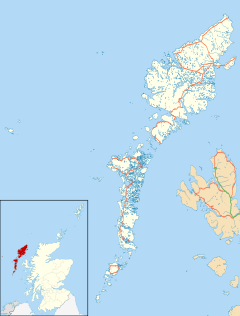Gravir facts for kids
Quick facts for kids Gravir
|
|
|---|---|
 Gravir folk museum |
|
| Language | Scottish Gaelic English |
| OS grid reference | NB375156 |
| Civil parish |
|
| Council area | |
| Lieutenancy area | |
| Country | Scotland |
| Sovereign state | United Kingdom |
| Post town | ISLE OF LEWIS |
| Postcode district | HS2 |
| Dialling code | 01851 |
| Police | Northern |
| Fire | Highlands and Islands |
| Ambulance | Scottish |
| EU Parliament | Scotland |
| UK Parliament |
|
| Scottish Parliament |
|
Gravir, known as Grabhair in Scottish Gaelic, is a small village found on the Isle of Lewis in Scotland. It sits right by the water, on the shore of Loch Odhairn, which is a type of sea loch. Gravir is part of the Lochs area.
In Gravir, you will find a Free Church, a school, and a fire station run by volunteers. There is also a pier, which is a platform built out over the water. Long ago, many people in Gravir used small plots of land for farming, a practice called crofting. However, this way of life has become less common over the past 50 years. The main road leading to the village is the B8060, which continues on to other places like Orinsay and Lemreway.
What Happens in Gravir?
Fishing and Farming
The pier in Gravir is mostly used by boats involved in fish farming. These boats help to raise fish in special areas of the loch. Smaller fishing boats and leisure boats also use the pier. The fish farm in Loch Odhairn is run by a company called the Scottish Salmon Company.
Future Energy Plans
In 2007, a company called Scottish and Southern Energy suggested a big project for Gravir. They wanted to build a special station above the village. This station would help to send electricity from the Isle of Lewis to the mainland of Scotland.
The plan involved a large cable running under the sea. This cable would bring electricity from two proposed wind farms on the island. The electricity would then be sent across the Minch, which is the sea channel between the Outer Hebrides and mainland Scotland.
The cable would enter Loch Odhairn near the fish farm. It would then run along the bottom of the loch and be buried underground. From there, it would go up to the new station on the hilltop. Overhead power lines would connect this station to the wind farms and to another power station nearby.


